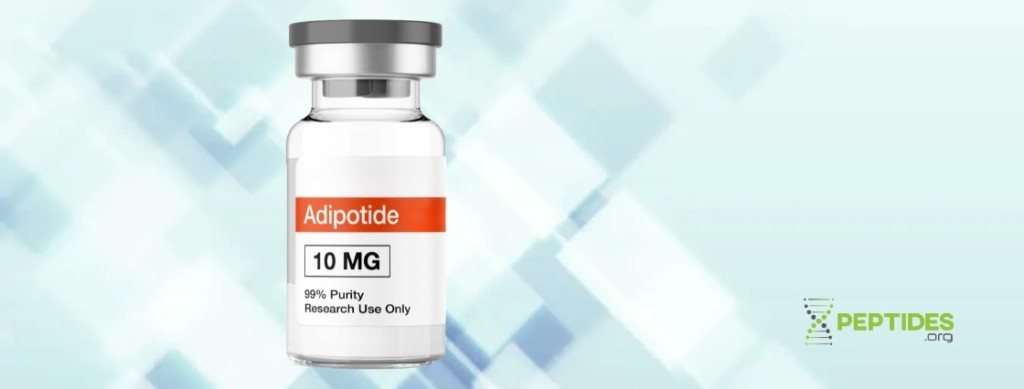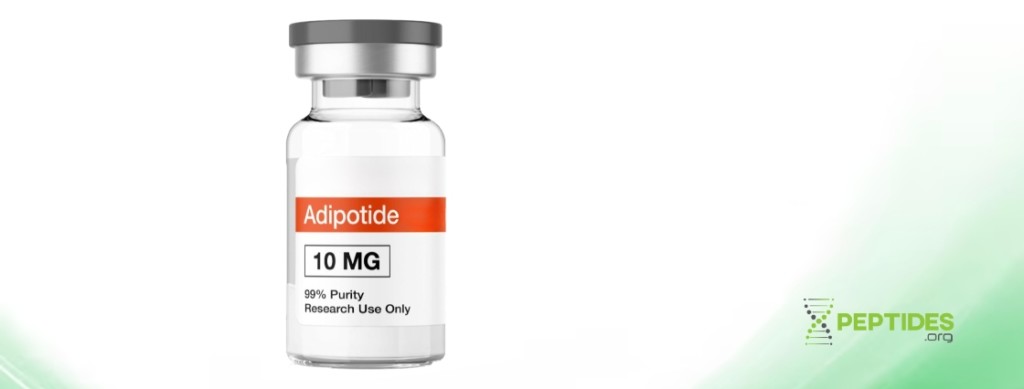With the seemingly uncontrollable rise of obesity, researchers are increasingly wondering what adipotide dosage to use in their next experiment.
Adipotide is an experimental weight loss agent that targets and kills fat cells by reducing the blood supply they need for survival. Preclinical studies have demonstrated that adipotide can:
- Induce weight loss
- Reduce appetite
- Boost insulin sensitivity
In this educational guide, we break down the available evidence on this fat loss agent, and include an adipotide dosage calculator.
We also include our recommendation on where researchers may securely order adipotide online.
Buy Adipotide from our top-rated vendor...

Disclaimer: Peptides.org contains information about products that are intended for laboratory and research use only, unless otherwise explicitly stated. This information, including any referenced scientific or clinical research, is made available for educational purposes only. Likewise, any published information relative to the dosing and administration of reference materials is made available strictly for reference and shall not be construed to encourage the self-administration or any human use of said reference materials. Peptides.org makes every effort to ensure that any information it shares complies with national and international standards for clinical trial information and is committed to the timely disclosure of the design and results of all interventional clinical studies for innovative treatments publicly available or that may be made available. However, research is not considered conclusive. Peptides.org makes no claims that any products referenced can cure, treat or prevent any conditions, including any conditions referenced on its website or in print materials.
Adipotide Dosage Chart | Quick Breakdown
| Weight (lb) | Daily Adipotide Dosage (4.53 mcg/lb) | Maximum Duration |
| 100-150 | 455-680mcg | 28 days |
| 151-200 | 685-905mcg | 28 days |
| 201-250 | 910-1,150mcg | 28 days |
What is Adipotide?
Adipotide is an experimental peptide that has been studied for its potential to induce weight loss and improve glucose tolerance in research subjects [1, 2]. In the literature, it is often referred to as “prohibitin-targeting peptide 1” (prohibitin-TP01) and “Fat Targeted Proapoptotic Peptide” (FTPP).
Researchers have observed adipotide to systemically target the endothelium of fat through a ligand-directed mechanism, thereby reducing the blood supply of white adipose tissue—the predominant fat found in the human body. Seminal adipotide research in obese primates and rodents has reported adipotide’s ability to reverse high-fat diet-induced obesity through this targeted induction of apoptosis mechanism [1].
In May 2012, researchers started a Phase I dose-finding trial of adipotide in patients with metastatic prostate cancer and obesity, all for whom standard treatment options were not an option. That trial was discontinued in January 2019 for unspecified reasons, with no reports of clinical development thereafter [2].
Adipotide is available online as a research chemical and may be legally purchased by licensed researchers and laboratory professionals for laboratory experimentation only.

Adipotide Benefits
The global obesity pandemic is in full swing, with worldwide prevalence having tripled since 1975. For example, the World Health Organization (WHO) estimated in 2022 that 60% of Europeans are either overweight or obese [3].
Adipotide is seen as a promising weight loss agent to help combat this pandemic. It is a vascular-targeted drug that has shown rapid weight loss in animals through its triggering of the apoptosis of adipose endothelial cells [4].
Research into the benefits of adipotide is still in its infancy, and as stated above, clinical development of the drug has been discontinued for unspecified reasons. Nevertheless, here is a summary of what we do know about adipotide so far:
- Kolonin et al. (2004) demonstrated that adipotide interacts with prohibitin 1 in the adipose vasculature of mice to trigger the ablation of white fat. The researchers observed a ~30% weight reduction in the rodent subjects over a four-week period following adipotide administration [5].
- Kim et al. (2010) investigated the effects of adipotide in high fat diet-induced obese rodents over a period of 27 days, reporting that the peptide completely reversed the obesity and reduced the body weight of the rodents. The team found that the fat loss occurred due to the rodent’s reduced food intake, suggesting that adipotide targets excessive adipose tissue caused by the consumption of a high fat diet [6].
- Barnhart et al. (2011) oversaw a series of adipotide studies involving three types of Old World monkeys, confirming, inter alia, that the peptide can be used to decrease white adipose tissue via targeted apoptosis within the blood vessels of that tissue. The researchers observed body weight decreases of up to 38.7% in obese, adipotide-treated primates, putting forth adipotide as a candidate drug for the treatment of obesity in human patients [1].
- Staquicini et al. (2011) identified adipotide as a potential advanced cancer therapy due to its ability to target prohibitin, which is linked to certain types of cancer. Because cancer cells require significant blood supply to grow and metastasize, adipotide’s targeting of prohibitin in those cells without harming surrounding tissue makes it a candidate for further research in this field [7].
- Kim et al. (2012) posited that chronic white adipose tissue (WAT) inflammation may play a role in causing obesity, and that macrophage recruitment in WAT increases insulin resistance. The team treated high fat diet-induced obese mice with adipotide, demonstrating that the peptide rapidly and potently improved glucose tolerance in the subjects. This supported the researchers’ hypothesis that adipotide administration reverses impaired glucose regulation as a result of impaired WAT function [8].
Adipotide Side Effects
Due to the limited amount of adipotide research conducted to date, researchers have not been able to definitively pronounce on the peptide’s side effects and safety profile.
As of this date, the Barnhart et al. (2011) research involving three species of Old World primates (rhesus monkeys, baboons, and crab-eating macaques) appears to be the best starting point for researchers looking for information on adipotide side effects. Notably, primates who were treated at an adipotide dose of 0.43mg/kg daily for four weeks [1]:
- Exhibited normal levels of activity without any overt clinical signs of nausea, vomiting, or food aversion
- Showed normal lipid profiles that did not vary throughout the study
- Registered higher levels of serum creatinine from adipotide doses of 0.25mg/kg
- Increased urine, with mild dehydration being reported at the highest adipotide dose levels
Most changes in the primates’ serum and urine were reversed within 28 days following discontinuation of treatment [1].
More importantly, toxicology studies in the treated monkeys revealed that the most prominent adverse effects of adipotide were kidney lesions and altered tubular function, albeit with the researchers observing that these were “relatively mild, predictable, and reversible” [1].
Nevertheless, important kidney function markers to monitor during adipotide research include risks of:
- Decreased serum phosphorus and potassium
- Glucosuria
- Proteinuria
- Increase in transitional/renal epithelial cells
While researchers at the University of Texas M.D. Anderson Cancer Center commenced a dose-finding and safety study into adipotide in 2012, the human trial was discontinued for unspecified reasons and no safety data was made publicly available [2].
Adipotide Dosage Calculator and Guide
The scarcity of adipotide research has also prevented experts from determining standardized, safe, and effective adipotide dosage guidelines. However, here is what we can glean from the limited research available:
- While the daily dose of 0.43mg/kg daily was well tolerated in primates in the Barnhart et al. (2011) studies, it is important to note that dosage in primates does not scale to humans [1].
- In the discontinued dose-finding trial undertaken at the Anderson Cancer Center, the investigators established a starting dose of 0.03mg/kg of body weight, injected subcutaneously once daily for 28 days. It is important to note that this trial involved obese patients with advanced prostate cancer, and the objective of the trial was to determine the highest tolerable dose of adipotide in said group [2].
Bearing this information in mind, anecdotal reports suggest that adipotide should be dosed conservatively in research settings, stating that the daily dose should not exceed 0.01mg/kg of bodyweight, which is equal to 4.53 mcg/lb, injected subcutaneously for up to 28 days.
Based on this data as a reference, here is a sample adipotide dosing protocol for research:
- Daily Dose: 0.01mg/kg of bodyweight.
- Frequency: Once daily in the form of a subcutaneous injection.
- Study Duration: 28 days.
- Notes: Monitor kidney function daily, due to an increased risk of tubular toxicity after the first week of the trial. One 10mg Adipotide vial suffices for 10 days of administration per subject with a body weight of 200lb.
Since research on adipotide is pending, researchers are well-advised to stay up to date on latest developments for more information.
Now, we will look at where to safely and securely buy adipotide online for research.

Where to Buy Adipotide Online? | 2024 Edition
In our experience, there is no retailer better than Pure Rawz for the online purchase of adipotide for research.
Here's why:
Pure Rawz
PureRawz is a well-recognized vendor that manufactures top-tier products via rigorous quality control measures at all phases of production.
Let’s explore in detail why PureRawz is a go-to vendor of the global research community:
- Quality is guaranteed and fully verified: To bolster its claim of 99% purity on all peptides, the vendor does first- and third-party lab testing on all products, including research peptides.
- Competitive pricing: The vendor’s manufacturing practices enable it to offer top-quality products at reasonable prices. Adipotide 10mg is currently offered for $87.48.
- Quick shipping: Shipping rates are also competitive with services offered to select international locations. US orders over $100 are shipped free of charge and typically arrive within 4-10 business days.
- Smooth checkout and data protection: Checkout is rapid and easy on the user-friendly website that features the latest SSL-encryption technology for data protection. Payment methods are clearly delineated, and a wide range is accepted including credit cards and PayPal.
- Service is unmatched: PureRawz is committed to researcher satisfaction, and it shows in its service practices. The helpful staff offers rapid responses to questions, and mistaken orders are readily replaced.
For an unquestionably satisfying peptide purchase, check out this impressive research peptides vendor below:
Buy Adipotide from our top-rated vendor...

Adipotide Dosing | Verdict
Adipotide has been shown to accelerate fat loss in laboratory animals by specifically targeting and eliminating fat cells. In addition, adipotide has been used to improve glucose tolerance in preclinical studies, opening the door to its potential use as a treatment of metabolic disorders.
Safety and dosage data in humans is not available for adipotide as of this writing. Accordingly, researchers are advised to proceed with extreme care when investigating this peptide.
This includes both sourcing the peptide from a reputable vendor, and following best practices when reconstituting the peptide for injection.
For licensed researcher looking to obtain adipotide, we recommend buying only from trusted vendor like our top-rated one.
